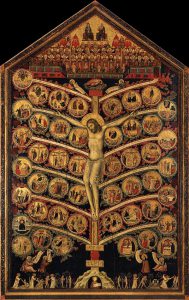Let me tell you about a friend: He was an atheist for the first part of his life but in his 20s, became Christian. He encountered Jesus, fell in love with Him, gave his life to God, and started serving in his church!
But then came a problem: His prayer life started to suffer. He didn’t read the Bible as much and started missing Sunday worship here and there. This went on for a few months, and then a few years. What happened? He said, “It’s so hard to pray. I didn’t get anything out of it. I don’t feel close to God.”
Who here knows what’s going on in his life? This is an  extremely common situation for Christians. Many of us felt closest to God when we were young but started drifting away later on in life. Others among us have experienced God in our lives: We’ve gone on a retreat, heard a talk and were on fire, but now, we don’t feel close to God.
extremely common situation for Christians. Many of us felt closest to God when we were young but started drifting away later on in life. Others among us have experienced God in our lives: We’ve gone on a retreat, heard a talk and were on fire, but now, we don’t feel close to God.
What Jesus said in the Gospel today gives us a possible answer to what we’re going through. There are three parts to it:
1) He says, “I am the true vine, and my Father is the vine grower. He removes every branch in me that bears no fruit. Every branch that bears fruit he prunes to make it bear more fruit” (Jn 15:1-2). What does this mean? It means that God often challenges us and allows us to suffer so that we grow. This is how it works: When we’re spiritually young, God gives us consolations, what we may call ‘good feelings’, in order to win us. We feel His love, see Him doing great things in our life, and so we love Him—this is good. As a result, we start going to Mass more, praying more, volunteering to help, etc.
Why are we doing these activities? Because we love God! However, it may also be because they make us feel good: It feels good to pray, to be with people at church, to lead a ministry, etc. And then God says, “Let’s see how authentic your love is.” We start getting nothing out of prayer, and those people at church who used to be so nice, we find out are jerks and gossips. Mass becomes boring and we don’t feel close to God. Consequently, we have a decision to make: Do we give up or keep on praying and serving?
I went through this very painful but important stage of spiritual growth. After my conversion, I was on fire, but then God called me to the seminary and I hated it: I didn’t know how to pray, I didn’t get along with the other guys, and I missed home. How could God be calling me to something that hurts so much?
When I shared this with my spiritual director, he said that what I was going through was normal and explained it this way: “God is like a good father. When he has a newborn child, he gives the child Pablum, which tastes good, in order to get the child to eat. But very soon the father takes it away and starts giving solid food, like vegetables, which don’t taste as good but help the child grow. And then the child has a choice: either he’ll accept the vegetables or refuse them. If he refuses, then the father will give the child Pablum, but he’ll never grow.”
Most of us do things in life because we get something out of it. We love people who love us and are fun to be around; we serve because it makes us feel good and it’s rewarding for us; we pray because we need stuff. We are more selfish than we may think. However, God wants us to love as He does: to love even when we get nothing out of it. Truly loving people love the people who hurt and annoy them and they volunteer for things that no one else wants to do because it’s the loving thing to do. They spend more time praising God than asking Him for things.
So, when God takes away the feelings, do we keep on serving and praying? In other words, do we love the God of consolation or the consolation of God? Well, we’ll find out when He takes away the good feelings.
 2) Jesus says, “My Father is glorified by this, that you bear much fruit and become my disciples” (Jn 15:8), and He mentions bearing fruit five times today (vv. 2, 4, 5, 8). He wants us to be fruitful, which means that we love as He does, keep His commandments, and live a virtuous life (Fr. Raymond Brown, SS, The Anchor Bible, The Gospel According to John XIII-XXI, 675, 680)!
2) Jesus says, “My Father is glorified by this, that you bear much fruit and become my disciples” (Jn 15:8), and He mentions bearing fruit five times today (vv. 2, 4, 5, 8). He wants us to be fruitful, which means that we love as He does, keep His commandments, and live a virtuous life (Fr. Raymond Brown, SS, The Anchor Bible, The Gospel According to John XIII-XXI, 675, 680)!
Moreover, there’s a second part to fruitfulness: giving spiritual life to others. When Jesus talks about pruning so that we bear more fruit, He’s talking about evangelization, taking responsibility for our neighbour, and laying down our lives for them (Brown, 676). Essentially, it’s too easy for us to go to Mass, go to talks, watch EWTN and then keep everything to ourselves. Jesus prunes us by difficulties in order to make us reach out! We no longer get satisfaction in taking care of ourselves only, but discover that the deeper satisfaction is to take responsibility for other people.
3) Pay as much attention to actions as to feelings. People often tell me, “Father, I don’t feel close to God.” I say, “Okay, let’s talk about it.” And then we do. In the process, we discover that they are faithful to prayer, they are taking care of other people, and are trying to do God’s will. I conclude, “But you are close to God! Look at the things you’re doing. If you weren’t close to God, you couldn’t love the way you’re loving.”
We are conditioned to evaluating things based on feelings, and feelings are valid because they tell us how we’re doing internally. But that’s not the whole story.
For example, how’s our day going so far? We right away think about how we’re feeling. However, I’d challenge you to think about how have we loved? Did we smile when it was difficult to smile? Did we listen when we wanted to do our own thing? Did we do our duty even when it was hard?
Do you remember what Jesus says? It’s not what happens to us that defiles us, but what comes out of us: “For from within, out of the heart of man, come evil thoughts, fornication, theft, murder, adultery, coveting, wickedness, deceit, licentiousness, envy, slander, pride, foolishness. All these evil things come from within, and they defile a man”(Mk 7:21-23). What makes a day good is not so much what happens to us, but how we respond: We loved, did what was right; we were courageous, humble and prudent! That’s a great day!
I know this is very hard to understand, especially when we’re suffering, so let’s pray for each other today to help us see why God is taking away all the good feelings we used to get. And let’s pray that we do God’s will no matter what. At some point, we have to make a deep personal decision in our lives: “I’m not going to judge my relationship with God only by how I feel. I’m not going to judge my day just based on how I feel. I’m also going to judge it based on how I loved.”

 Think about this final question: What was the most fruitful part of Jesus’ life? Was it His miracles, the crowds surrounding Him, the disciples following Him, His teaching? The answer: It was three hours dying on a cross, three hours of suffering and love. This felt horrible. He felt totally abandoned by God. Was He? No, but He felt as if He were. In those three hours, we saw the greatness of His love for us. When the centurion standing there saw how He died, He said, “Truly this man was the Son of God!” (Mk 15:39).
Think about this final question: What was the most fruitful part of Jesus’ life? Was it His miracles, the crowds surrounding Him, the disciples following Him, His teaching? The answer: It was three hours dying on a cross, three hours of suffering and love. This felt horrible. He felt totally abandoned by God. Was He? No, but He felt as if He were. In those three hours, we saw the greatness of His love for us. When the centurion standing there saw how He died, He said, “Truly this man was the Son of God!” (Mk 15:39).
One of the greatest joys is to see people make this jump in spiritual maturity! I know this fellow who always had a good relationship with God. In his college years, he got very close to God. But, later on, things were tough for years: he doubted his vocation in life, he wasn’t doing well at work, and all of his faults were coming out. However, when he chose to persevere, to focus more on virtue, I said, “You’ve grown! You’re like Jesus now: You’re loving even when it’s difficult.”
Jesus wants us to grow and bear fruit. That’s why He prunes us.